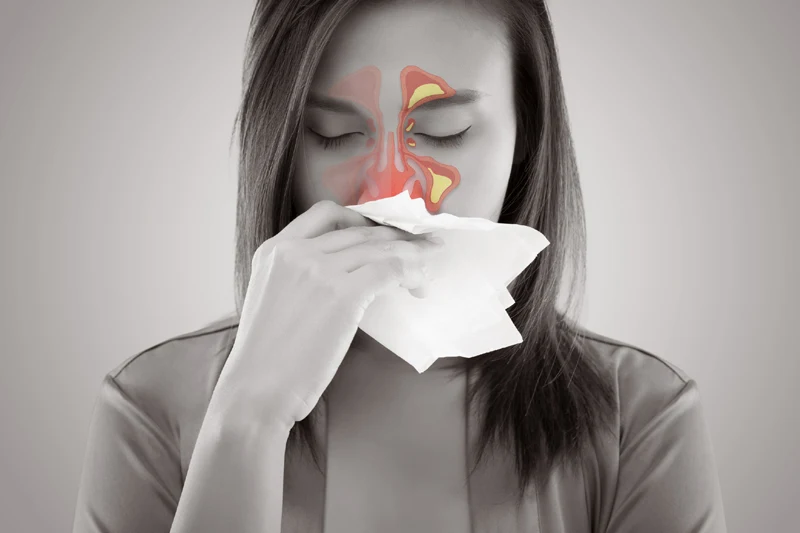![[feature] Symptoms You Didn’t Realize Were Actually Caused by Allergies](https://blogger.googleusercontent.com/img/b/R29vZ2xl/AVvXsEhA_NGW_gRS-x_H6R1Sm4M9nqIQQLZmz-XcfEq4_U9GHKWdPcqrd6aPqVpAcVO8xHtxUtsWZ297cXk0aCcQNlQzGNpjC9_GzJCxsHCIstm573ww4QVO_CfvllrgPDaYwSC1QnjOMpLhSyb4/s1600-rw/autos.dearjulius.com.jpg)
Allergies are the sixth leading cause of chronic illness in the U.S. More than 50 million Americans suffer from allergies each year, according to the CDC. Allergies can generally not be prevented; allergic reactions can, if you know the source.
The definition of an allergy and an abnormal response to something that normally occurs in the environment. And the most reliable way to distinguish an allergy from a non-allergic condition is a skin or a blood test, Dr. Tania Elliott, spokesperson for the American College of Allergy, Asthma, and Immunology (ACAAI).
A general rule is: If the allergen is something you breathe in, your reaction will usually affect the eyes, nose and lungs. If you eat the allergen, the symptoms are likely to show up in and around the mouth, stomach and intestines.
If you’re allergic to food, you’ll probably have hives, redness, itchy skin, Dr. Elliott says. If it’s a severe allergy, difficulty breathing and throat closing are common. If the source is environmental, then you’ll likely experience itchy eyes, runny nose, and sneezing, she adds.
Asthma
 |
| © iStock |
Asthma and environmental allergies often go hand-in-hand, Dr. Elliott says. It is triggered by exposure to the same irritants that prompt allergy symptoms. More than 26 million people in the U.S. have asthma, and allergic asthma is the most common type, affecting around 60 percent of people with asthma, according to the Asthma and Allergy Foundation of America.
Coughing
 |
| © iStock |
Allergy coughs are typically caused by swelling or irritation of the airways. Allergies like hay fever can cause a chronic dry cough, according to ACAAI. A cough that doesn’t go away for three or more weeks may be due to an allergy, Dr. Elliott says. “So if you get a ‘cold’ for three weeks every August, you should get tested for allergies.”
Dry skin or Eczema
 |
| © iStock |
Atopic dermatitis, which may know as eczema, can be a reaction to food and environmental allergens, Dr. Elliott says. Most people think it’s a reaction to food, but they are often wrong, she adds. “The only wat to know is a blood test.” You see patches of dry skin at specific location, usually behind the knees or around the neck, she adds. The condition is common among children, who often outgrow it by the time they are 8-10 years old. Eczema can get worse if the skin comes in contact with certain soaps, detergents, metals, fragrances or even sweat.
Sinus infection
 |
| © iStock |
Sinusitis usually develops because of allergies or a cold. “It’s confusing because uncontrolled allergies make you predisposed to allergic reactions,” Dr. Elliott says. You make extra mucus, as if the body is fighting an infection, and you get sinus pain and pressure. “The fluid gets infected with a virus or bacteria due to untreated allergies,” she adds.
Headaches
 |
| © iStock |
You get them typically because your sinuses get filled up, Dr. Elliott says. “Your frontal sinus is filled and that can lead to a headache.” But this won’t be the only symptom if it’s caused by an allergy, she adds. Itchy skin, a rash, runny nose, watery eyes – common allergic reactions will be triggered as well.
Irritability
 |
| © iStock |
Most people won’t make the connection. “We get desensitized to symptoms if they are untreated for a long time,” Dr. Elliott says. But this is a mistake. If you are not feeling well for weeks, and no one can tell you what’s wrong because all of your tests have come back negative, you’d be annoyed, too.
Brain fog
 |
| © iStock |
Allergic irritability syndrome is a quantifiable way to define the decreased ability to focus, as well as other downstream symptoms of untreated allergies, that occur as side effects.
Mood swings
 |
| © iStock |
The fatigue syndrome of allergic origin is a common cause of irritability and abnormalities of behavior in children, according to some research. Allergy-related mood changes are typically characterized by experiencing feelings like sadness, weariness and fatigue. Allergies can make them even worse if a person has been diagnosed with clinical depression.
Sore throat in the morning
 |
| © iStock |
This will be the case if, for example, you had a dust mite allergy, Dr. Elliott says. “Dust mites are common indoor allergens.” This allergy can cause a sore throat in the morning because your head and nose is close to the cause for the allergy – pillows and comforters – throughout the night. You get better during the day because you are away from it, Dr. Elliot adds.
Vomiting
 |
| © iStock |
“The GI tract is lines with allergy cells,” Dr. Elliott says. A reaction occurs when your immune system overreacts to a food or a substance in a food, incorrectly identifying it as a danger and triggering a protective response, according to ACAAI.
Nausea
 |
| © iStock |
This is another common sign of food allergies. Nausea and vomiting are rarely, if ever, symptoms of a seasonal allergy. If your GI comes in contact with something you’re allergic to, your body will perceive that substance as dangerous and releases histamine to counteract it. Histamine can cause several vague symptoms, including nausea.
Chronic fatigue
 |
| © iStock |
Chronic fatigue syndrome is a heterogeneous disorder characterized by easy feverishness, diffuse pains, and depression. Many patients also report drug allergies, according to research. Studies results of epicutaneous skin testing demonstrated a high correlation with history in 24 patients. Atopy coexists with the chronic fatigue syndrome in more than half of patients.
Sleep problems
 |
| © iStock |
They are common in people with allergies. And it makes sense why: When you inhaled something in the air you are allergic to, such as pollen or molds, your nasal passages become inflamed and irritated. These particles trigger the release of a chemical that causes nasal congestion, sneezing, watery eyes, and/or runny nose. Who can sleep having to deal with that?
Itchy ears
 |
| © iStock |
Itchiness is common if you have an allergy. But itchy ears? Not unheard of. The culprit can be as simple as your shampoo or your jewelry. They can cause a rash called contact dermatitis, Dr. Elliott says.
Frequent infections
 |
| © iStock |
This is really the consequence of a weakened immune system due to untreated allergies. Uncontrolled and untreated symptoms can wear down the immune system. This will typically lead to more severe problems, including infections that don’t heal as fast as expected.























